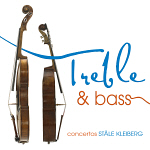More often than not, classical music recordings with cute titles and seemingly gimmicky programming amount to little more than, well, cute and gimmicky productions and unhappy listening experiences. But in this case, the title is apt and the programming choice absolutely right on, making for a pleasant, surprising discovery. I say “discovery” because, in spite of his reputation in his native Norway and his music’s appearances on various orchestra and opera programs, many listeners will not be familiar with this 51-year-old teacher/composer, who has only a handful of recordings in the catalog. (His Requiem was performed in Washington, DC on September 11, 2004 and recorded by the Washington National Cathedral choir and chamber orchestra for Simax.)
In these two eminently engaging works, each lasting about 25 minutes, you don’t have to try hard to recall Sibelius (the organically evolving thematic ideas), or Shostakovich and Bartók (the sometimes sharply angular melodic lines and overtly irregular rhythms)–but as usual with the best composers, these apparent similarities are only that: Kleiberg’s fertile material and his skillful manner of developing it are entirely his own. He not only blazes a challenging but always accessible trail for his soloists, but he perfectly integrates the solo and orchestral voices into a seamless and very dynamic dialogue. And for those who love the big, romantic concertos of yesteryear, you’ll find no difficulty in moving from Brahms or Tchaikovsky to these robust and essentially romantic modern works that revel in the timbres and textures and dynamic power of a symphony orchestra at the service of a single, albeit virtuosic instrumental protagonist.
We’ve heard Marianne Thorsen before as a soloist in such successful recordings as her Mozart concertos (type Q11782 in Search Reviews) for this same label and as a chamber player with the Leopold String Trio (which she founded in 1991) and the Nash Ensemble. Here she delivers a completely convincing, technically impeccable (and we assume, authoritative) performance that also leaves us impressed with Kleiberg’s artful, intelligent exploitation of the violin.
And speaking of artful, intelligent exploitation–the Double Bass concerto (composed in 1999, six years before the Violin Concerto) offers a masterful juxtaposition of the instrument’s more often used (and abused) lower register with its almost cello-like upper range, and so for most of this dramatic and unusually lyrical work we forget the strangeness of the concept and just hear it as a viable, legitimate marriage of solo instrument and orchestra–absolutely no gimmick here. This is great stuff! And, like violinist Thorsen, bassist Göran Sjölin is an ideal interpreter who really seems to enjoy the chance to dig into a well-conceived, serious starring role. We’re familiar with conductor Daniel Reuss from his many very fine recordings of choral and orchestral music, and he certainly doesn’t disappoint here, expertly managing his soloists and the first-rate Trondheim Symphony Orchestra, making a case for these works as strongly as could be imagined. The sound, which this label prides itself on, justifies the label’s claims. Highly recommended! [7/27/2009]
































